May 26, 2025 | 12:35 GMT +7
May 26, 2025 | 12:35 GMT +7
Hotline: 0913.378.918
May 26, 2025 | 12:35 GMT +7
Hotline: 0913.378.918
Vinarice - a Vinaseed Group member - is one of the major rice seedling production centers and exporters in the Mekong Delta, with an annual output of approximately 100,000 tons of rice and 50,000 tons of seedlings.
Dong Thap is the "heart" of the Mekong Delta and a focal point province, with a large rice production area and significant potential for the development of a rice commodity value chain. As a consequence, Vinaseed invested 350 billion VND to implement the Rice seedling and agricultural processing industrial center program in the province of Dong Thap, which eventually led to the establishment of Vietnam Rice Company Limited (Vinrice).
Based on traditional advantages, experience, and technological prowess, the human resource team, production, and consumption network of the Vinaseed group, Vinarice has constructed a successful research-cultivation-production-postharvest-trade rice value chain.
Mr. Truong Tan Tai, the General Director of Vinarice, stated that the company is presently concentrating on two major sectors: rice seedling production and trade, as well as rice product production, processing, trade, and exports.
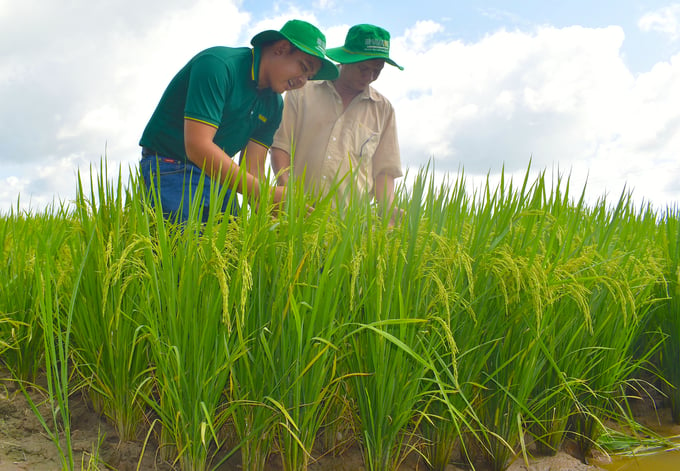
Vinarice regularly sends staff to visit the fields with farmers. Photo: Minh Dam.
On an area of approximately 3,500 hectares, Vinarice's association activities and rice seed production are primarily concentrated in the province of Dong Thap. To service Mekong Delta farmers, the company has organized the production and distribution of Vinaseed's copyrighted crop seed product lines, including the rice varieties Dai Thom 8, Thom RVT, Huong Chau 6, VNR20, and Japonica DS1. Specifically, the Dai Thom 8 rice variety was awarded second place at the Vietnam Science and Technology Innovation Awards (VIFOTEC).
Currently, Dai Thom 8 accounts for roughly 40 percent of the aromatic rice export structure in Vietnam. This rice variety is also selected by a number of localities as an essential variety for the planning of quality and sustainable rice production areas with an annual production area of more than one million hectares.
Upon visiting the RVT Thom rice production field in the Thap Muoi district, we learned from farmers that the company has truly invested a great deal of money into the model, from standard rice seeds to decontamination costs, and has routinely dispatched technical personnel to inspect fields.
However, rice seedlings are frequently neglected by foreign merchants. When companies encounter difficulties and are unable to negotiate a price with producers, they promptly purchase. When confronted with this circumstance, a great number of coal companies are dejected. However, there are still producers in Vinarice who refuse to give up the industry. The production association model with nearly one hundred members of the Rice Seed Cooperative Group (in My Hoa commune, Thap Muoi district) managed by Mr. Ha Thanh Thao, who has accompanied Vinarice for many years, is the most prevalent.
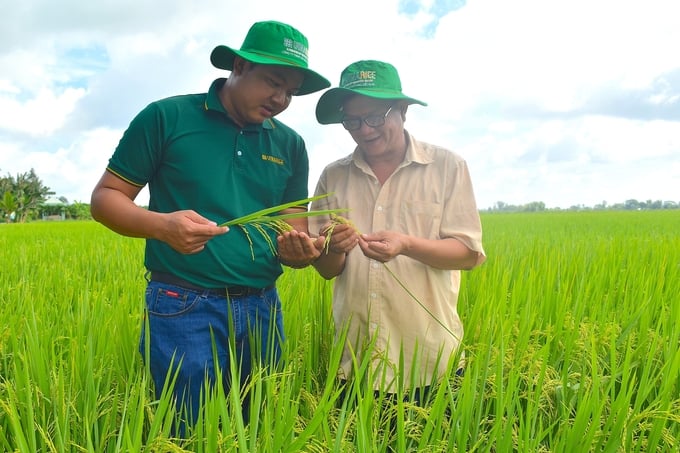
The association model between Vinarice and farmers in My Hoa commune is strong due to trust from both sides. Photo: Minh Dam.
According to Mr. Thao, Vinarice progressively teaches farmers how to cultivate efficiently and provides numerous incentives and support. Decontamination is the most essential and costly aspect of rice seed cultivation. Vinarice routinely employs knowledgeable personnel to assist customers and also contributes to these costs.
Regarding prices, the company establishes the market price for rice seeds ten days prior to harvest and provides additional support of 1,000 - 1,200 VND/kg for pure-bred rice and approximately 600 - 700 VND/kg for rice issued confirmation of line sowing.
Mr. Thao calculated and asserted that the profit when collaborating with Vinarice reached 50%, or approximately 30-35 million VND/ha/crop, depending on whether the land was pure or impure.
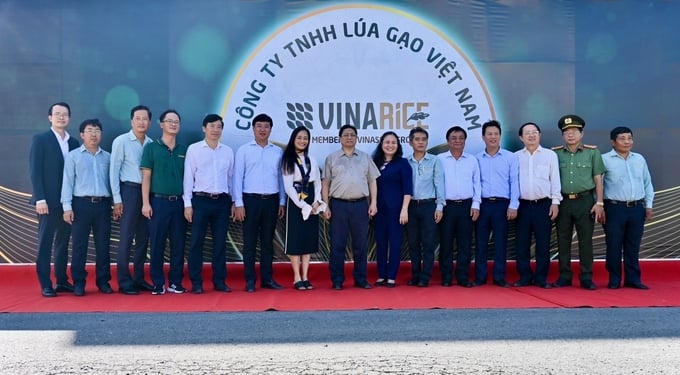
Prime Minister Pham Minh Chinh visited Vinarice's rice processing factory on August 13. Photo: TL.
Tran Truong Tan Tai, general director of Vinarice, stated that the company has successfully organized production linkages along the safe rice value chain as well as the transfer of plant varieties, applications, sustainable farming solutions, Agritax and Farm Record intelligent agricultural management applications, and traceability.
Simultaneously, the company implements a circular production model, green and sustainable agricultural production, and develops the rice value chain by putting producers at the center and creating brands.
Vinarice has partnered with thousands of producers in the Mekong Delta to cultivate high-quality commodity rice on an area of approximately 15,000 hectares. Products from the field are transported to the Vinarice Factory, which is equipped with a modern Japanese synchronous processing line system. The factory is managed and administered in accordance with HACCP and FSSC 22000 guidelines.
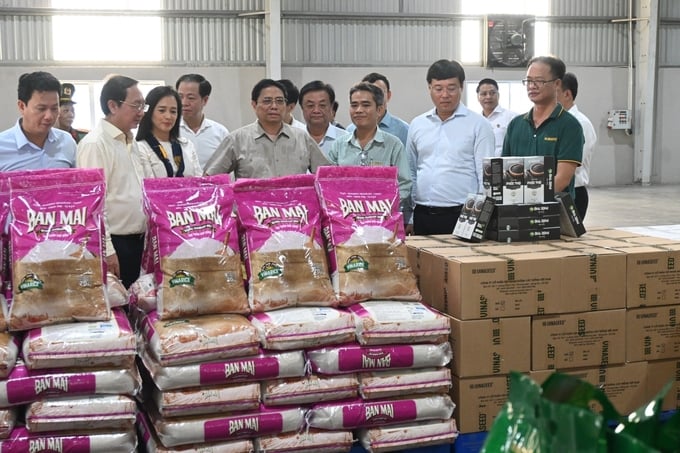
At the visit to Vinarice Rice Factory, the Prime Minister emphasized that the company needs to improve the competitiveness of its products by attaching importance to deep processing. Photo: TL.
Thus, creating products that satisfy the most stringent quality and safety requirements of importers from the United States, Canada, Europe, Japan, Australia, and the premium domestic market segment. Particularly in the Canadian market, Vietnamese-branded rice has penetrated the world's largest supermarket chain, Costco, creating new opportunities for Vietnamese rice on international shelves and contributing to the enhancement of its brand.
Regarding the form of production association, Vinarice Company provides seeds at the prescribed selling price along with a complete invoice certificate for traceability. Training in farming techniques to guarantee maximum economic efficacy, such as lowering costs and boosting output. Covering all output in the region, producers cooperated at market prices.
Vinarice is also coordinating with the Thap Muoi District People's Committee to construct a 700-hectare linked field model. Model of the application of information technology and modern machinery to the management of production based on water, fertilizer, environmental indication, and pH, thereby assuring the development of plants and their productivity. Maximum productivity, material and fertilizer conservation, and environmental protection. Vinarice uses the products it produces to process branded rice for export to Europe.
This production model has altered farmers' practices from agricultural production to agricultural economy by emphasizing pure production and enhancing the quality and value of products.
Mr. Tran Truong Tan Tai stated: "The company wants world consumers to know about Vietnamese rice through authentic brands, traceability, and decent quality, not through "white sacks" as it did."
Translated by Linh Linh
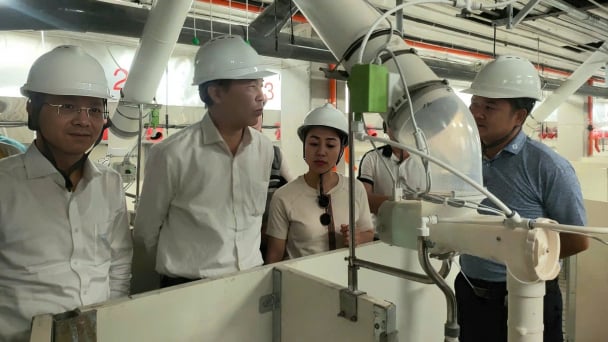
(VAN) Despite investment costs being 1.5 to 1.8 times higher than conventional methods, multi-story pig farming demonstrates outstanding effectiveness, increasing land-use efficiency by 4 to 10 times.
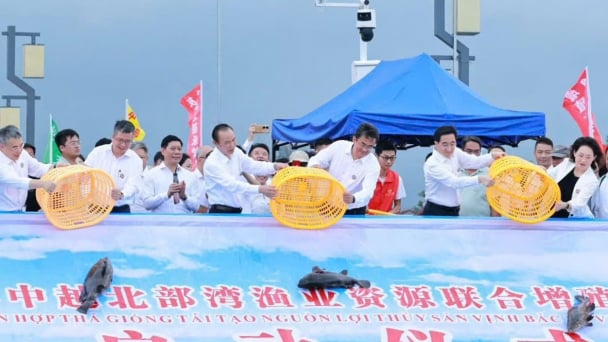
(VAN) Deputy Minister of Agriculture and Environment Phung Duc Tien leads a working delegation to participate in several key activities in China aimed at promoting agricultural and fisheries cooperation.
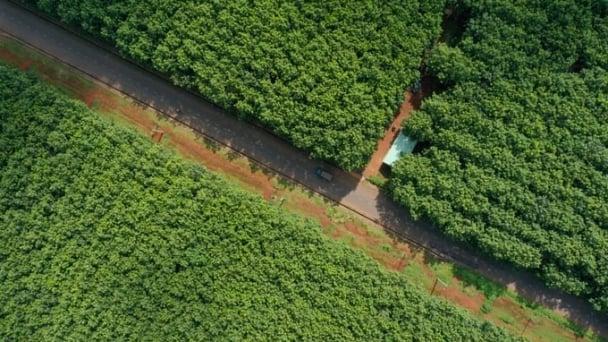
(VAN) The European Commission has just released a list of ‘low-risk’ countries for deforestation, which includes Vietnam.
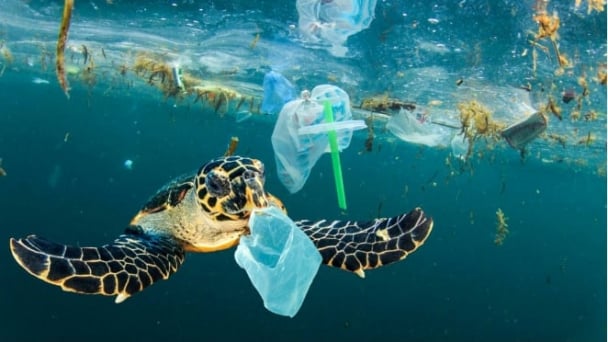
(VAN) The convenience of single-use plastics is leaving lasting consequences for the oceans.
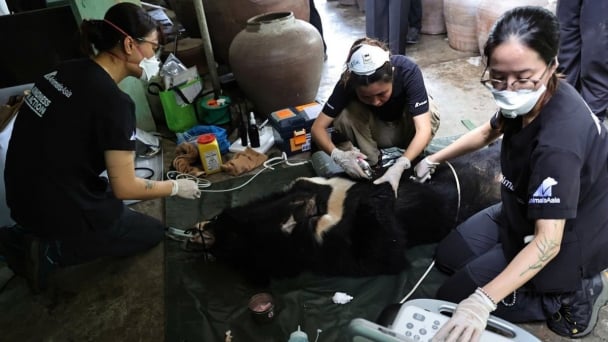
(VAN) On the morning of May 23, in Nghe An, the Animals Asia Foundation successfully rescued a Tibetan bear and transferred it to the Vietnam Bear Rescue Centre located in Bach Ma National Park.
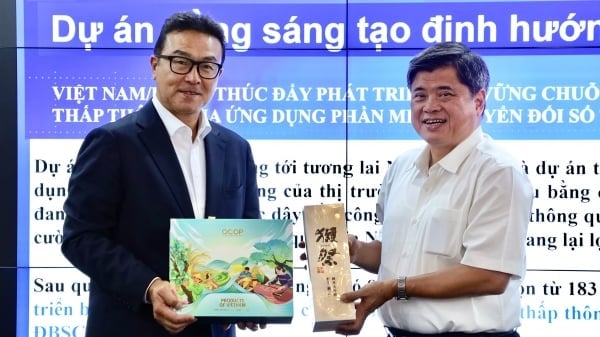
(VAN) On May 23, Deputy Minister of Agriculture and Environment Tran Thanh Nam held a working session with a Japanese delegation on the application of digital technology in agricultural production.

(VAN) In the tranquil wetlands of Van Long, there are quiet souls who guard the forests, nurture the waters, and oversee every bird and troop of langurs as protecting the essence of a living heritage.